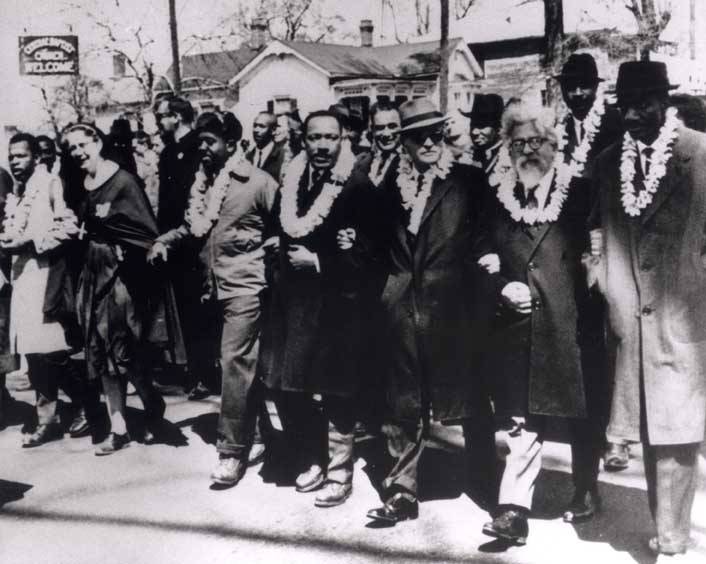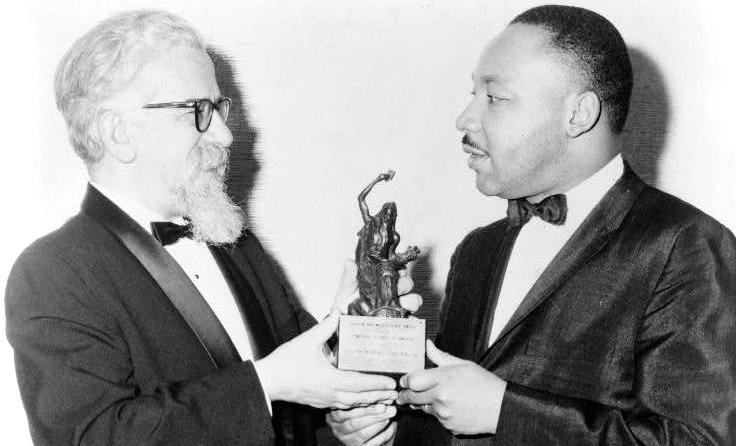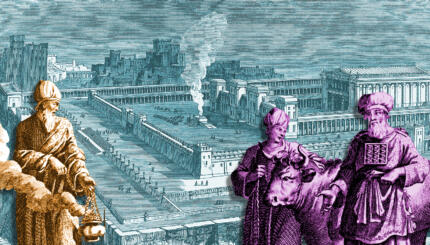Abraham Joshua Heschel (1907-1972), a descendant of two important dynasties, was born in Warsaw. After receiving a thorough Jewish education in Poland, Heschel entered the University of Berlin, where in 1934 he received his doctorate for a study of the biblical prophets… . In 1937 Heschel became Martin Buber’s successor at the Judisches Lehrhaus in Frankfurt and head of adult Jewish education in Germany, but the following year, he and other Polish Jews were deported by the Nazis. [Martin Buber (1878-1965) was a German-Jewish social and religious philosopher. The Frankfurt Lehrhaus, an experimental center for adult Jewish education, aimed to teach marginal, acculturated Jews about Judaism.]
After stays in Warsaw and London, in 1940 he came to the United States to teach at the Hebrew Union College. In 1945 Heschel became professor of ethics and mysticism at the Jewish Theological Seminary in New York and began to publish a series of works, ranging from studies on the piety of East European Jewry and the inward character of Jewish observance, to religious symbolism, Jewish views of humanity, and contemporary moral and political issues. Before his untimely death, Heschel had become highly respected among American religionists of many faiths not only for his writings but also for his active role in the civil rights and peace movements of the 1960s and in the Jewish-Christian dialogue.
A Unique and Vivid Style

Heschel’s literary style is unique among modern Jewish religious authors. Remarkable juxtapositions of the concrete and the abstract, suggestive similes and metaphors, striking aphorisms and extended images, concepts from classical and existentialist philosophy, are all used to evoke the numinous quality of the divine and the capacity for human self-transcendence. Heschel’s aim is to shock modern man out of his complacency and awaken him to that spiritual dimension fading from the contemporary consciousness. Because he stresses now one and now another polarity of the religious experience and because of the rich cumulative impact of his style, Heschel’s point of view does not lend itself to paraphrase or brief summary. The following remarks are limited to a few characteristic themes.

Help us keep Jewish knowledge accessible to millions of people around the world.
Your donation to My Jewish Learning fuels endless journeys of Jewish discovery. With your help, My Jewish Learning can continue to provide nonstop opportunities for learning, connection and growth.
Heschel’s Thought: “Radical Astonishment” and Confronting the Ineffable
In Heschel’s view, the basic intuition of reality takes place on a “preconceptual” level; a disparity always remains between what we encounter and how we can express our encounter in words. The great achievements of art, philosophy, and religion are brought forth in movements when the individual senses more than he can say. “In our religious situation we do not comprehend the transcendent; we are present at it, we witness it. Whatever we know is inadequate; whatever we say is an understatement…Concepts, words must not become screens; they must be regarded as windows.”
How can modern man regain a personal awareness of God? A universally accessible feeling is the experience of the sublime—for example, in the presence of the grandeur of nature. A sense of the sublime entails wonder and “radical astonishment” Astonishment is radical because it embraces not only what one sees but the very act of seeing and the very self that is astonished in its ability to see.
The individual confronts the “ineffable,” that which cannot ever be expressed in words. Heschel insists that the ineffable is not a psychological state but an encounter with a mystery “within and beyond things and ideas” The divine is “within” because the self is “something transcendent in disguise.” The divine is “beyond” because it also is, “a message that discloses unity where we see diversity; that discloses peace where we are involved in discord…God means: No one is ever alone.”
A second experience that, according to Heschel, awakens the individual to the presence of God is a pervasive, underlying anxiety that he calls “the need to be needed.” Religion entails the certainty that something is asked of man and that he is not a mere bystander in the cosmos. When the individual feels the challenge of a power, not born of his will, that robs him of self-sufficiency by a judgment of the rightness or wrongness of his actions—then God’s concern for his creatures is grasped.
The Prophetic Model of Spirituality
For Heschel, it is the Bible—particularly the prophets—that provides a primary model for authentic spirituality. Biblical revelation is not a mystical act of seeking God but an awareness of being sought and reached by Him: The prophets bear witness to an event that they formulate in their own words, but the event itself is God’s reaching out. It is not propositonal truths about God or general norms and values that the prophets transmit but the “divine pathos” (pathos from the Greek root denoting emotion, feeling, passion). The divine pathos is God’s outraged response to man’s sin and his merciful response to man’s suffering and anguish. Heschel does not actually attribute “pathos” to God’s metaphysical essence, but sees it as a corrective to a conception of monotheism that restricts the scope of God’s knowledge to universal principles only…
A Jew Takes Leaps of Action
A third mode of apprehending God’s presence is the life of holiness. A few of Heschel’s aphorisms convey his rejection of a utilitarian, sociological approach to Jewish observance and his supracognitive, mystical feeling for halacha [Jewish law]. The halacha sharpens men’s sympathy to the ineffable: “To perform deeds of holiness is to absorb the holiness of deeds.” “A Jew is asked to take a leap of action rather than a leap of thought. He is asked to do more than he understands in order to understand more than he does.” Whereas the term ceremony merely expresses what we think, mitzvah expresses what God wills: a mitzvah [commandment/good deed] is “a prayer in the form of a deed.”
For Heschel, Jewish survival is a spiritual act. God’s concern with man is expressed in Judaism through the idea of a covenant imposing a mutual, correlative responsiveness on man and God both, because God needs man for the attainment of his ends in the world.
Heschel stands in that stream of modern Jewish thought which emphasizes the limitations of reason to grasp the full significance of the religious life. His approach has been called “devotional philosophy”, a religious rhetoric, mystical apologetics—all honored and accepted types if religious writing. Heschel himself characterized his method as “depth theology,” the attempt to rediscover the questions to which religion is the answer…Heschel is perhaps closest to the Neo-Orthodoxy tendency in modern Protestant thought (Karl Barth, Reinhold Niebuhr, and others) sharply critical of liberal religion’s assumption that man can perfect himself by his own unaided efforts and motivated, above all, by the aim to recover biblical faith as an inward dynamic process. Whereas Protestant Neo-Orthodoxy turns for inspiration to Luther and the other theologians of the reformation, in Heschel traditional Hasidic piety finds its authentic modern voice.
Reprinted from Jewish People, Jewish Thought, published by Prentice-Hall.



